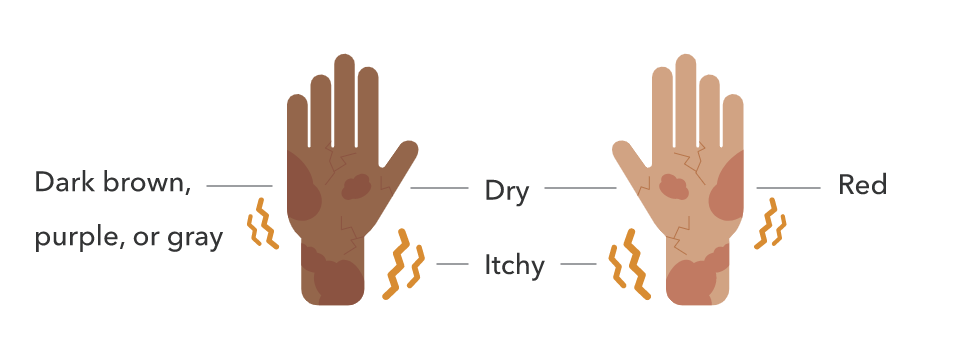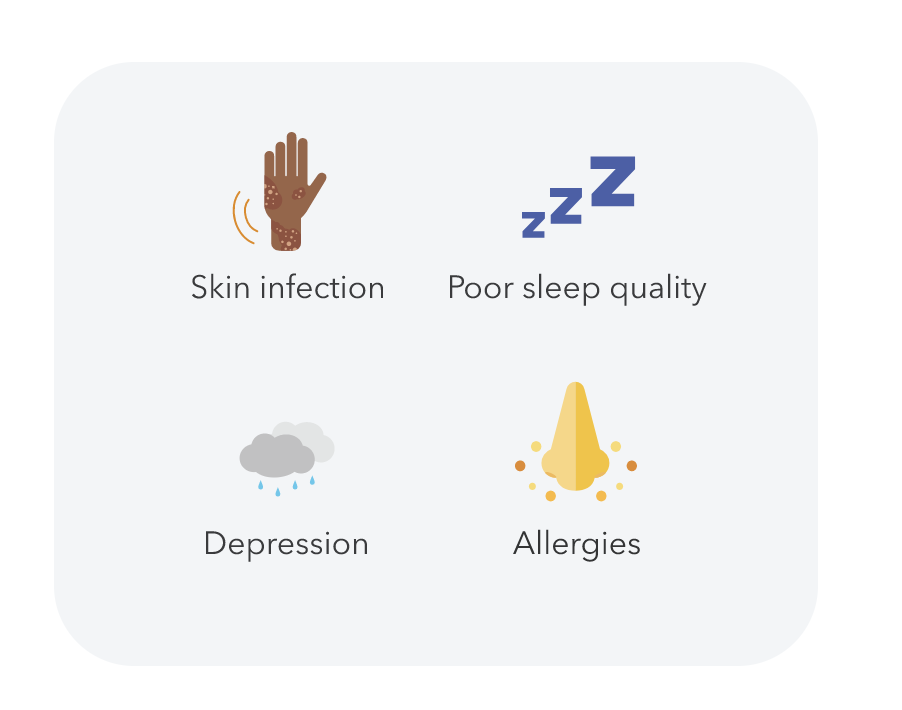Is Eczema Genetic?Explore Eczema and what your DNA can tell you
What is eczema?
Eczema is a skin condition that causes dry, discoloured, and itchy skin. People with eczema are more likely to get skin infections and are more likely to develop asthma and allergies. Atopic dermatitis (AD) is the most common type of eczema, and the two terms are sometimes used interchangeably.
What is atopic dermatitis?
Normally, the skin holds on to moisture and provides a protective barrier against allergens and microbes like bacteria. In atopic dermatitis (the most common type of eczema), the skin barrier is impaired, which causes the skin to lose moisture. This can lead to dry, discoloured, and itchy skin. In people with darker skin, the affected area may be dark brown, purple, or gray. In people with lighter skin, the affected area may be red and easier to recognize.

Is eczema genetic?
Genetics does play a role in eczema. This means some people will be more likely to develop it based on their genetics.
Much of the variation in eczema risk and severity that we see between people is due to genetics, with the estimated heritability at about 75%. In some rare cases, eczema can be caused by DNA variants found in a single gene, for example, CARD11 variants, but most cases are caused by the interplay of environmental triggers and genetic factors that we don’t yet fully understand. Many common genetic variants have been associated with an increased likelihood for developing eczema, with each individual variant contributing just a small amount to overall chances.
In fact, over 2,000 of these common genetic markers are used to estimate one’s likelihood of developing eczema in 23andMe’s Eczema (Atopic Dermatitis) report which is powered by 23andMe research. However, the report does not provide information about the rare cases of eczema caused by variants in single genes, such as CARD11.
Types of eczema
Atopic dermatitis is the most common form of eczema and is the one 23andMe reports on. According to the American Academy of Dermatology Association, there are seven types of eczema in all:
- Atopic dermatitis.
- Contact dermatitis.
- Neurodermatitis.
- Dyshidrotic eczema.
- Nummular eczema.
- Hand eczema.
- Stasis dermatitis.
What causes eczema(atopic dermatitis)?
In addition to family history, your age and ethnicity can also impact your chances of developing eczema. This condition typically begins during infancy or childhood but can occur at any age. For some people, symptoms resolve before adulthood. For others, symptoms continue to come and go (flares).
Eczema isn’t generally thought of as an autoimmune condition itself, but a recent paper shows that people with atopic dermatitis, especially those with more severe cases, may have an increased risk of certain autoimmune conditions.
What triggers eczema(atopic dermatitis) flare ups?
Triggers can vary from person to person and can include:
- materials like wool
- chemicals sometimes found in detergents and perfumes
- certain foods
- allergens like dust and pollen
What are the symptoms of eczema?
According to the American Academy of Dermatology Association, symptoms in adults include:
- Patchy, scaly skin
- Itchy skin
- Swollen, discoloured skin
- Raw, bleeding skin or oozing
- Deep lines in the palms
- Skin infections
What to know about eczema on dark skin
African American and Asian American children are more likely to develop more severe forms of eczema. This may be due in part to delayed diagnosis because eczema can sometimes be missed in people with darker skin. In addition, according to the National Eczema Association, eczema appears to be more common in African Americans. Studies have found that 19.3% of Black children have atopic dermatitis and are 1.7 times more likely to develop it compared to white children.
Eczema is typically thought to appear as a red, itchy rash. However, eczema on dark skin can have darker discolouration than it would on lighter skin, making it more difficult to see and harder to diagnose. It can show up as darker brown, purple, or even gray in colour. Atopic dermatitis can also show up in unique ways on darker skin, such as small bumps on the arms, legs, torso, or even around hair follicles. Itching is a common symptom that studies have shown to be more severe in Black patients. Additional characteristics like swelling, oozing, or dryness can help confirm diagnosis. Once healed, the affected area can turn a lighter or darker colour compared to the surrounding skin, but usually returns to its normal colour once the eczema is under control.
How can eczema impact your health?
People with eczema are more likely to get skin infections and may also experience poor sleep quality due to discomfort from itching. Depression and anxiety are more common in people with eczema, especially in those with severe forms of eczema. In addition, because people with eczema have a heightened immune response to common allergens, they are more likely to develop allergies and asthma.

How is Eczema Treated?
Eczema cannot be cured, but a treatment plan created by a healthcare provider, such as a dermatologist, can help control flare-ups, ease symptoms, and prevent eczema from getting worse. Treatment plans often include specific skin care routines, trigger management, and medications.
You can also take action on your own by:
- Keeping your skin hydrated using a fragrance-free moisturizer
- Keeping your skin clean (short warm baths or showers followed by moisturizer)
- Avoiding harsh soap
- Identifying and avoiding triggers
Find out if your genetics might increase your likelihood of developing Eczema
Interested in learning how your genetics may be related to eczema? You can get the Eczema (Atopic Dermatitis) report (Powered by 23andMe Research) through the 23andMe+ Premium membership. 23andMe+ Premium includes everything in our Health + Ancestry Service plus new premium reports and features throughout the year.

23andMe+ Premium
Please note:
- The Eczema (Atopic Dermatitis) report does not diagnose eczema and should not be used to make medical decisions.
- The report was developed by 23andMe scientists using data and insights gathered from thousands of customers who consent to participate in our research. Reports based on 23andMe research provide an estimate of your likelihood of developing a condition based on your genetics and other factors. This report does not account for lifestyle or family history.
- The report does not account for every possible genetic variant that could affect your likelihood of developing eczema.
References